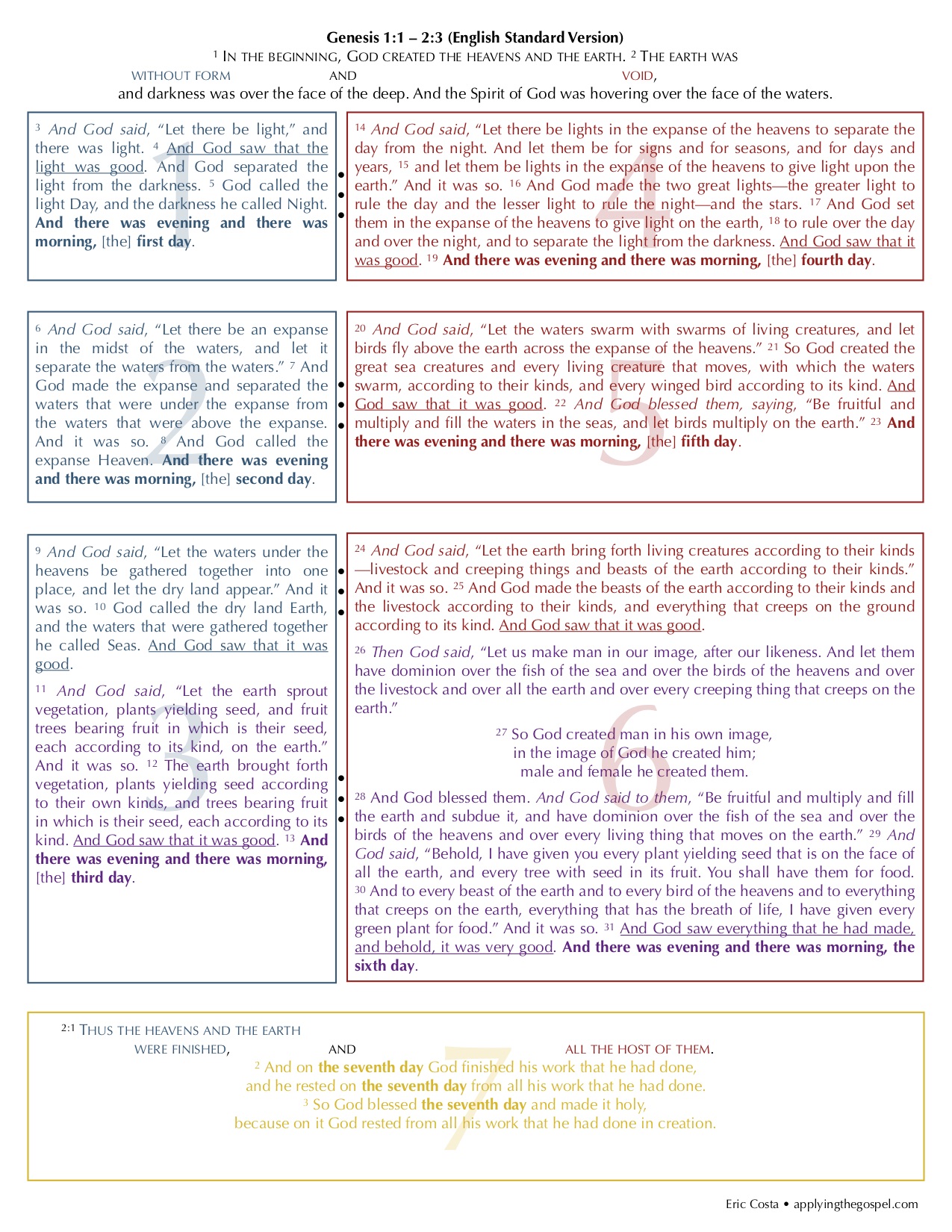Genesis 1:1 – 2:3 (visually arranged here) is one of the most familiar passages in the Bible. In spite of our familiarity, many do not appreciate it for what it actually is. The mistake is made because of modern cultural expectations that we bring to our reading of the text. We imagine it to be a primitive attempt at science, to be squared with—or refuted by—”actual science.” We assume it’s trying to answer questions of process: “How?” “When?” “In what order?” But those are the wrong questions. It isn’t some sort of dry, objective, scientific treatise. We should let the text speak for itself. Or, sing, as the case may be.
This passage is a song. You see careful structure, artistic patterns, repeated refrains, atmospheric themes. The Holy Scriptures open with a song. The first thing God has revealed about himself is that he is a God of song who delights over his Creation (cf. Job 38:4-7; Zephaniah 3:17). The Bible is full of songs, including songs about God as Creator and his Creation (e.g., Psalms 8, 19, 29, 104, 148). God’s very being is song, the hum of love of Father for Son in the Spirit. God makes himself heard in Creation.
We are moved to song by what we love. We sing to those whom we love. The singer cares, and that care compels him to communicate the depth of his care through song. Songs convey profound meaning, significance, value, personality; machines don’t sing, people sing. Songs are revealing, intimate; the singer’s heart is on display through his voice. This makes for a beautiful opening to the Scriptures, a wonderful recital of God’s original purpose in his Creation, his celebration of it.
There is a crescendo: “‘Let us make man in our image…’ and behold, it was very good” (1:26, 31). Kingly creatures for communion with the singing God.
There is a refrain: “And there was evening and there was morning” (1:5, 8, 13, 19, 23, 31). Post tenebras, lux. Darkness, then dawn. Six times, almost complete.
There is a sustained ending: “God blessed the seventh day and made it holy, because on it God rested…” (2:3). The divine presence entered the temple he had made, to dwell with his Creation. Glory. Perfection. Fulfillment. Joy. Everything is the way it’s supposed to be. But, the Song ends without conclusion. No “evening… morning… the seventh day.”
The Song continues, even now. It was, in a way, dampened by the loud din of human rebellion, the sound of the world breaking. But the angels renewed the Song at the birth of Jesus Christ, the new human, “God with us.” There was darkness on the evening of his death, but the universe rang again with the Song of Life at the dawn of the third day, at the first crack of Resurrection sunlight. In himself, Jesus is the temple, the new creation, the perfect communion of God with his kingly creature in one Person. Now he sits, the divine presence with humanity, resting, dwelling, ruling in heaven. And one day, soon, with the music of trumpets, the Everlasting Dawn will rise over the New Heavens and the New Earth, and all things will be how they were meant to be from the beginning.
Keep the Sabbath holy. It’s the best part of the Song that God is singing.

